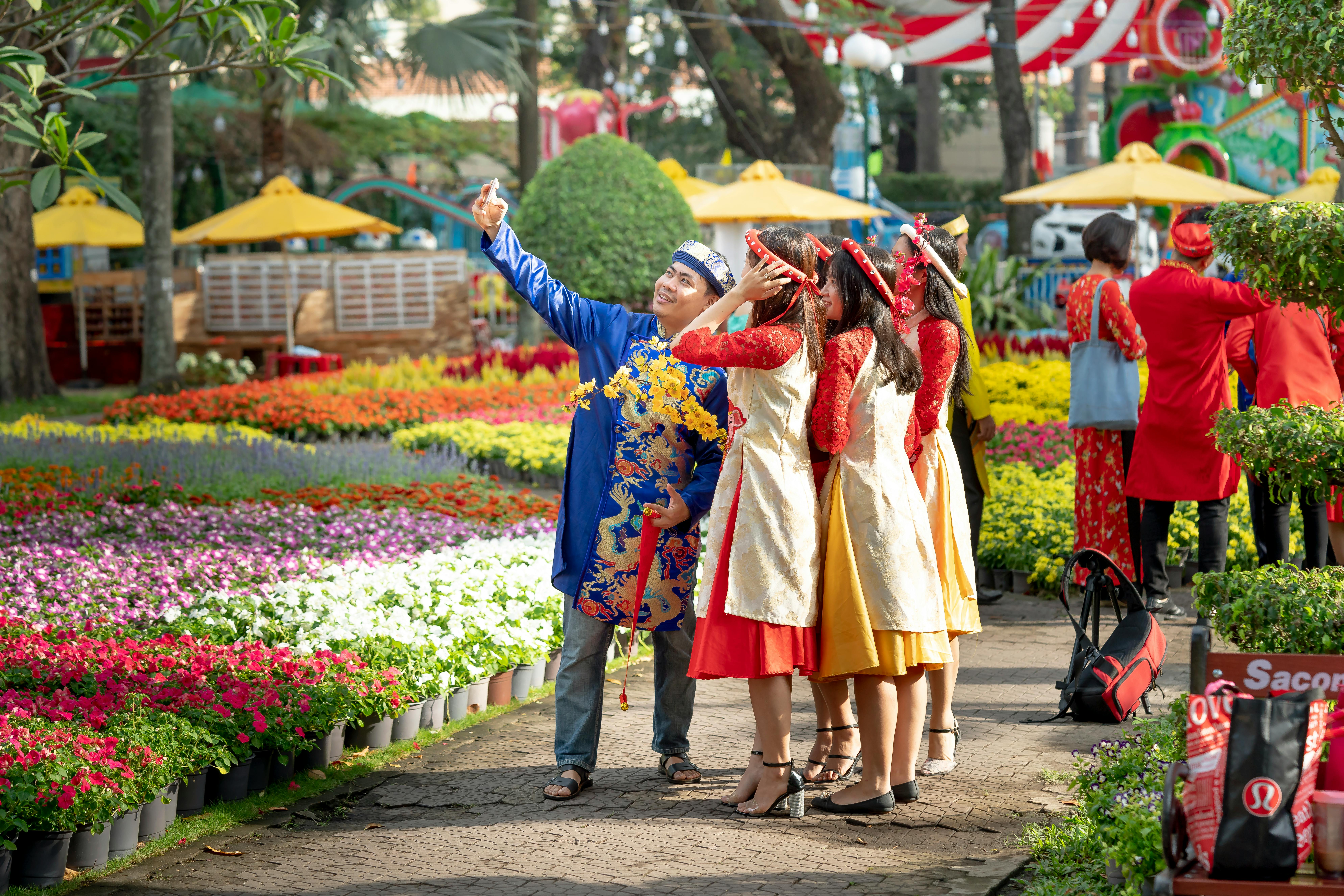
Vietnam is a country marked by its vibrant history and diverse culture, and public holidays play an essential role in reflecting this identity. The government designates specific days each year as public holidays, allowing citizens to commemorate significant historical events, honor ancestors, and celebrate seasonal changes. These holidays provide opportunities for family gatherings, community festivities, and cultural expression.
Public holidays in Vietnam typically encompass a blend of both modern and traditional occasions. They serve as a time for relaxation and reflection amid the busy lives of the Vietnamese people. Additionally, public holidays often coincide with various festivals and rituals that are deeply rooted in Vietnamese heritage, thus reinforcing familial ties and encouraging social interaction.
Significance of Public Holidays
The significance of public holidays in Vietnam extends beyond mere observance of dates. These celebrations embody the collective memory of the nation, reminding the people of their struggles, triumphs, and shared experiences. Each holiday carries its own set of meanings and practices—whether it’s honoring ancestors or celebrating national unity.
Public holidays also serve as a platform for cultural exchange, allowing younger generations to learn about their roots while engaging with contemporary elements. This harmonious balance between tradition and modernity is evident during festive periods when age-old customs coexist with newer trends, enriching the cultural narrative of the country.
Importance of Public Holidays in Vietnamese Culture
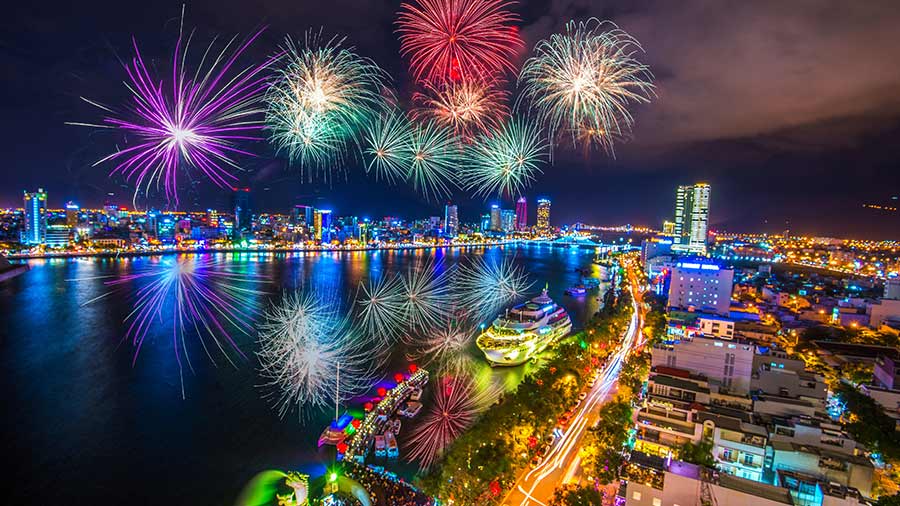
The importance of public holidays in Vietnamese culture cannot be overstated. They are intertwined with the fabric of society and offer a lens through which one can understand the values, beliefs, and historical context that shape the nation.
Historical Significance
Many public holidays in Vietnam have historical roots tracing back centuries. For instance, Tet Nguyen Dan, also known as the Lunar New Year, marks the start of the lunar calendar and is steeped in age-old traditions. It symbolizes renewal, hope, and the chance to pay respects to both the living and the deceased.
Similarly, holidays such as Liberation Day and National Day are pivotal in commemorating significant moments in Vietnam’s history. These occasions serve as reminders of the sacrifices made for independence and freedom, instilling a sense of pride among the citizens. The historical narrative tied to these holidays reinforces national identity and unity, fostering a collective consciousness that celebrates resilience and perseverance.
Cultural Practices and Traditions
Beyond their historical significance, public holidays are steeped in rich cultural practices and traditions. For example, during Tet, families clean their homes and prepare special foods as a way to welcome the new year and ward off bad luck. The preparation of traditional dishes such as Banh Chung (square sticky rice cake) often becomes a communal activity where family members gather to cook together, reinforcing bonds and sharing stories.
Festivities are likewise prominent during the Hung Kings Festival, where people participate in ceremonial offerings and ancestral worship to honor the nation’s forefathers. These practices allow individuals to reconnect with their roots and strengthen the cultural continuity that defines Vietnamese society.
List of Public Holidays in Vietnam for 2025

In 2025, Vietnam will observe a series of public holidays that reflect both the country’s historical milestones and cultural heritage. Each holiday has its distinct character and significance, providing citizens with opportunities to celebrate, reflect, and unite.
New Year’s Day
New Year’s Day in Vietnam, celebrated on January 1st, marks the beginning of the Gregorian calendar. Though it may not hold the same weight as Tet, it is still a time for celebration. Families often come together to share meals, and many people take the day off to rest and recuperate from the festivities of the previous year.
This holiday is characterized by joyous gatherings and fireworks displays in major cities. Urban areas witness bustling street parties as locals and tourists embrace the spirit of the New Year with enthusiasm. It serves as a time for individuals to set resolutions and intentions for the upcoming year, making it a meaningful occasion for personal reflection.
Tet Nguyen Dan (Lunar New Year)
Tet Nguyen Dan, or the Lunar New Year, is undoubtedly the most significant holiday in Vietnam. Expected to fall in late January or early February in 2025, Tet is a time of reunion and celebration, marked by various customs and practices. Preparations begin weeks in advance, with families cleaning their homes, paying off debts, and decorating with peach blossoms and kumquat trees.
During Tet, families honor their ancestors by setting up altars adorned with offerings of food and incense. Traditional foods, such as Banh Chung and pickled vegetables, hold symbolic meanings, representing prosperity and good fortune for the coming year. Fireworks, dragon dances, and cultural performances fill the streets, transforming cities into lively hubs of activity.
Hung Kings Festival
Celebrated on the tenth day of the third lunar month, the Hung Kings Festival honors the legendary founders of Vietnam. In 2025, this important holiday will take place in early May. The festival is centered around ancestral worship, with ceremonies held at temples dedicated to the Hung Kings, particularly in Phu Tho Province.
During this holiday, people engage in rituals that include offering food, flowers, and incense to show respect for their ancestors. Cultural performances, games, and traditional contests add to the celebratory atmosphere, bringing communities together in a shared sense of heritage. The Hung Kings Festival is a reminder of Vietnam’s storied past and the importance of cultural preservation.
Liberation Day/Reunification Day
Liberation Day, observed on April 30th, commemorates the fall of Saigon in 1975 and the reunification of Vietnam. This day is marked by parades, fireworks, and various events that celebrate national pride. It serves as a poignant reminder of the struggles endured during the Vietnam War and the sacrifices made for independence.
On this day, citizens reflect on the journey toward reunification while rejoicing in the achievements of the nation. Schools, organizations, and government institutions hold observances, promoting discussions about Vietnam’s history and future. The atmosphere is filled with patriotism as families come together to reminisce about the past and look forward to a united future.
International Labor Day
International Labor Day, celebrated on May 1st, recognizes the contributions of workers and labor movements worldwide. In Vietnam, it is viewed as a time to promote social justice, worker rights, and economic development. Many people take part in rallies and activities that highlight the importance of labor in shaping society.
For Vietnamese workers, this day offers an opportunity to celebrate their hard work and achievements. Organizations often organize events that encourage camaraderie and solidarity among employees, culminating in festive gatherings that foster a sense of unity. It also serves as a moment to advocate for better working conditions and benefits, emphasizing the commitment to workers’ welfare.
National Day
National Day, celebrated on September 2nd, marks the declaration of independence from French colonial rule in 1945. This holiday is an opportunity for citizens to reflect on Vietnam’s journey toward self-determination and sovereignty. Commemorative ceremonies, parades, and cultural events take place across the country.
National Day embodies the spirit of patriotism, with citizens proudly displaying flags and participating in community activities. Schools often organize educational programs to teach students about Vietnam’s history, inspiring them to carry forward the legacy of independence. The holiday acts as a unifying force, fostering a sense of pride among all Vietnamese people.
Detailed Look at Major Holidays
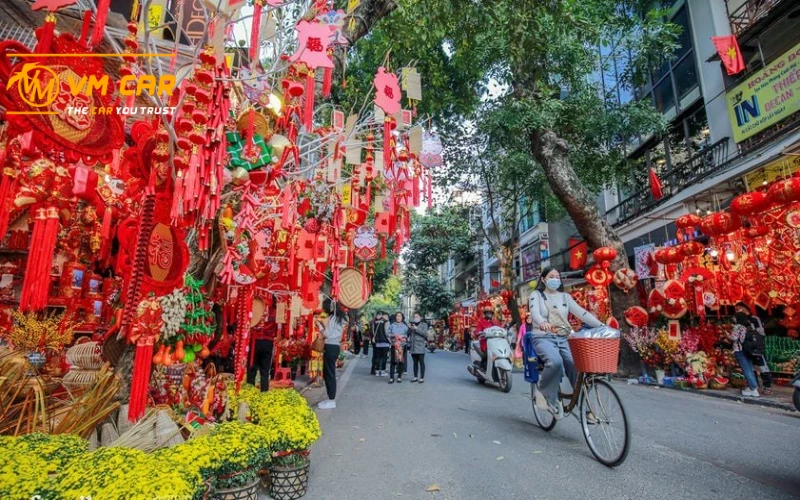
To appreciate the depth of Vietnamese culture, it is essential to delve into the details of its major holidays. Each holiday carries unique customs, practices, and emotional significance that contribute to the overall understanding of Vietnamese identity.
Tet Nguyen Dan: The Festivities
Tet Nguyen Dan is not just the beginning of the Lunar New Year; it is a vibrant celebration infused with deep-rooted customs and joyous festivities. In 2025, this momentous holiday will see families across Vietnam engaged in preparations well ahead of time.
One of the most notable aspects of Tet is the ritual of cleaning and decorating homes. Families take great care to ensure their living spaces are tidy and adorned with auspicious symbols, such as peach blossoms in the north and yellow apricot blossoms in the south. These decorations symbolize the arrival of spring and the hope for prosperity in the new year.
As the holiday approaches, families gather to prepare traditional dishes that play a fundamental role in Tet festivities. The centerpiece is usually Banh Chung, a square-shaped sticky rice cake with layers of mung beans and pork, wrapped in banana leaves. The process of making Banh Chung is often a communal affair, bringing families together in laughter and storytelling.
During Tet, families partake in various customs, including offering prayers to their ancestors, visiting relatives, and exchanging lucky money (li xi) to children and elders. The atmosphere brims with excitement, as people dress in new clothes and visit local markets bursting with goods. As midnight approaches, fireworks illuminate the skies, marking the official start of the lunar new year.
Hung Kings Festival: Commemorating Ancestors
The Hung Kings Festival is a profound expression of reverence and gratitude towards the founding fathers of Vietnam. Celebrated in early May in 2025, this holiday presents a unique opportunity for the Vietnamese people to connect with their history and honor their ancestors.
The festival centers around various religious and cultural activities held in numerous locations throughout the country, especially in Phu Tho Province, where the Hung Kings Temple is situated. During the festival, devotees carry out rituals that involve offerings of food, incense, and flowers to pay homage to the kings who established the first Vietnamese dynasties.
Cultural performances play a significant role in the festival, showcasing traditional music, dance, and folk games. Participants engage in competitions ranging from archery to tug-of-war, highlighting the spirit of camaraderie and competition. These activities epitomize the community’s commitment to preserving cultural heritage while forging connections through shared experiences.
Being part of the Hung Kings Festival offers an intimate glimpse into the heart of Vietnamese culture, as families come together to celebrate their roots and express gratitude for the sacrifices made by their ancestors. It serves as a powerful reminder of the importance of heritage and the continuous thread of family lineage.
Liberation Day: Reflection and Celebration
Liberation Day, observed on April 30th each year, holds immense significance for the Vietnamese people. This day marks the end of the Vietnam War and the reunification of the country, serving as a powerful symbol of resilience and hope.
In 2025, Liberation Day will be commemorated with grand parades, fireworks, and various festivities that honor the bravery of those who fought for independence. The atmosphere is electric, filled with patriotic fervor as citizens don national colors and join in celebratory events across the nation.
Schools and organizations often hold educational programs reflecting on the historical context surrounding the war, encouraging discussions about the sacrifices made for freedom. Many veterans share their stories, passing down invaluable lessons to younger generations—a heartfelt reminder of the price paid for peace and stability.
For families, Liberation Day offers a moment of reflection and a chance to come together in joy. Barbecues, picnics, and community gatherings create a sense of unity as people celebrate their freedom while remembering the struggles of the past. The emotions associated with this holiday run deep, blending pride with remembrance, creating a rich narrative woven into the fabric of Vietnamese identity.
Regional Variations in Holiday Observances
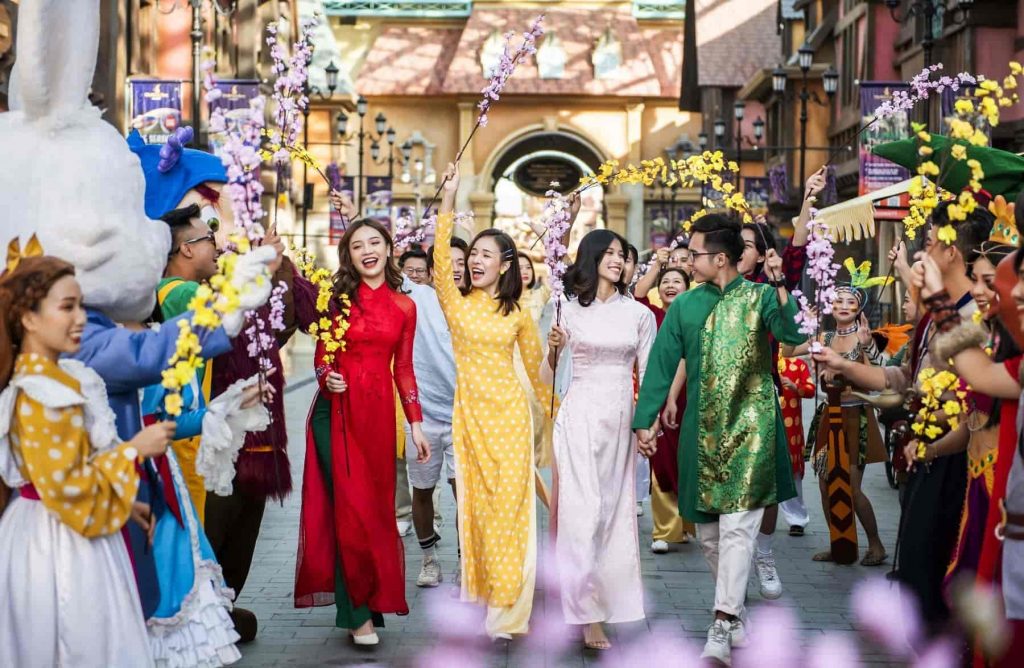
Vietnam’s diversity is reflected in the regional variations of holiday observances. Each area possesses its own unique customs and traditions that enhance the richness of the celebratory experience. Understanding these differences sheds light on the broader cultural landscape of the country.
Northern Vietnam Celebrations
In Northern Vietnam, holiday celebrations are often marked by a strong emphasis on tradition and adherence to customs. During Tet, for example, families meticulously follow age-old practices such as preparing specific dishes, performing ancestral rituals, and participating in local fairs.
In Hanoi, the capital city, preparations for Tet include vibrant flower markets, where residents purchase peach blossoms as a symbol of prosperity. Traditional music performances and folk games such as “bau cua ca cop” (a traditional gambling game) attract crowds, further enhancing the festive spirit.
During the Hung Kings Festival, northern regions witness large-scale ceremonies at temples dedicated to the kings. People gather to offer prayers, with many traveling long distances to pay tribute to their ancestors. The atmosphere is imbued with devotion and spirituality, reflecting the deep-rooted respect for history.
Central Vietnam Traditions
Central Vietnam boasts its own distinctive holiday practices that showcase the region’s cultural heritage. Festivals in cities like Hue are characterized by elaborate ceremonies, showcasing the imperial history of the Nguyen Dynasty.
During Tet, central families focus on preparing traditional food items such as Banh Beo (steamed rice cakes) and Gio Lua (Vietnamese pork sausage), which are quintessential to the region’s culinary identity. The celebrations often feature local folk songs and dances, creating a lively ambiance.
The Hung Kings Festival is celebrated with equal fervor in central provinces, where people participate in ceremonies that combine ancient rituals with modern festivities. Traditional games such as “đá gà” (cockfighting) draw participants from nearby neighborhoods, fostering a sense of community.
Southern Vietnam Customs
In Southern Vietnam, holiday celebrations reflect a fusion of local customs and influences from neighboring cultures. During Tet, families embrace the vibrant color of yellow apricot blossoms, which are particularly iconic in Ho Chi Minh City.
The southern approach to Tet includes lively night markets, where vendors sell everything from food to decorations. Traditional dishes such as Hu Tieu (rice noodle soup) and various types of sweets are prepared with a unique twist, adding diversity to the holiday feast.
For Liberation Day, southern cities come alive with cultural performances and parades that display vibrant costumes and traditional dances. The spirit of celebration is palpable, as citizens come together to commemorate the achievements of the past and envision a brighter future.
Impact of Holidays on Business Operations
Public holidays in Vietnam have a direct impact on business operations across various sectors. Understanding these dynamics is crucial for both local and international businesses looking to navigate the holiday landscape effectively.
Public Sector vs. Private Sector
In Vietnam, public sector employees enjoy several days off during public holidays, allowing them to partake in celebrations and spend quality time with family. Government offices close for extended periods during major holidays such as Tet and National Day, resulting in a temporary slowdown in administrative processes.
Conversely, private sector businesses may choose to remain open during certain holidays to capitalize on increased consumer spending. Retailers, restaurants, and entertainment venues often see a spike in activity during festive seasons, leading to flexible operating hours that cater to customer demand.
Understanding the balance between public and private sector operations during holidays allows businesses to strategize their staffing, inventory management, and marketing efforts accordingly. By aligning with local customs, companies can enhance customer engagement and maximize sales potential.
Tourism Industry during Holidays
Holidays in Vietnam present both opportunities and challenges for the tourism industry. During peak festive seasons, domestic and international travelers flock to popular destinations to immerse themselves in the vibrant culture and festivities.
Hotels and travel agencies often experience a surge in bookings, prompting the need for careful planning and resource allocation. Tour operators curate special itineraries that highlight holiday-specific events, offering visitors unique experiences such as participating in Tet celebrations or attending local festivals.
However, the influx of tourists can lead to overcrowding and heightened demand for services. Businesses must navigate the logistics of accommodating larger crowds while maintaining quality service. Striking a balance between local customs and tourist expectations is essential for delivering memorable experiences during this vibrant time of year.
Planning for Travel during Public Holidays
Traveling during public holidays in Vietnam can be both exciting and challenging. With a bit of foresight and preparation, visitors can make the most of their holiday experiences while navigating potential obstacles.
Best Destinations to Visit
When planning travel during public holidays, certain destinations stand out as must-visit locations. During Tet, cities like Hanoi and Ho Chi Minh City come alive with celebrations, offering bustling markets, stunning decorations, and lively street performances. Visitors can immerse themselves in local customs and savor traditional dishes that characterize the festivities.
For those interested in cultural exploration, destinations like Hoi An and Hue provide rich historical contexts and opportunities to engage with local traditions. In the countryside, rural areas showcase authentic celebrations, where visitors can participate in farming activities, learn about traditional crafts, and taste homemade delicacies.
While popular tourist spots can become crowded during holidays, exploring lesser-known regions can yield rewarding experiences. Cities like Da Lat or Phong Nha offer tranquil environments amidst the festive hustle and bustle, allowing travelers to appreciate Vietnam’s natural beauty.
Tips for Travelers
Traveling during public holidays in Vietnam requires thoughtful planning to ensure a smooth experience. Here are some tips for travelers:
- Book Accommodations Early: Given the high demand for hotels and guesthouses during holidays, securing accommodations well in advance is essential.
- Be Prepared for Crowds: Popular attractions and transportation routes may be crowded, especially during Tet. Allow for extra time in your itinerary to accommodate delays.
- Participate in Local Events: Embrace the festive spirit by participating in local celebrations. Engage with the community, try traditional foods, and attend cultural performances to gain a deeper understanding of Vietnamese culture.
- Respect Cultural Traditions: While enjoying the festivities, remain mindful of local customs and etiquette. Show respect during religious ceremonies and practice patience in crowded spaces.
By following these tips, travelers can enhance their holiday experience in Vietnam and create lasting memories during this vibrant time of year.
Food and Festivities Associated with Each Holiday
Food plays a central role in the celebration of public holidays in Vietnam, with each occasion featuring unique dishes that reflect cultural values and traditions. Understanding the culinary aspects of these holidays enhances the overall festive experience.
Traditional Dishes during Tet
Tet Nguyen Dan is synonymous with a variety of traditional dishes that hold symbolic meanings. One of the most famous dishes is Banh Chung, a square sticky rice cake filled with mung beans and pork. The preparation of Banh Chung is a family affair, with generations coming together to create this beloved delicacy.
Another staple during Tet is pickled vegetables, which represent fresh beginnings and the cleansing of the old year. Commonly enjoyed side dishes include gio lua (Vietnamese pork sausage) and xoi (sticky rice), which are often served during family feasts.
During Tet, families also prepare fruit platters filled with seasonal fruits, symbolizing abundance and prosperity. The act of sharing meals with loved ones during this time fosters a sense of connection and gratitude.
Special Treats for National Day
On National Day, culinary traditions reflect the spirit of patriotism and celebration. Street vendors and restaurants often serve traditional dishes that evoke national pride, such as pho (Vietnamese noodle soup) and banh mi (Vietnamese sandwich).
Barbecues and outdoor gatherings are common on National Day, with families and friends coming together to grill meats and share hearty meals. The festive atmosphere encourages a sense of togetherness, as laughter and joy permeate the air.
In urban areas, markets overflow with festive treats, including cakes and pastries decorated with national symbols. These special creations serve as delightful reminders of the significance of the day and the collective identity of the Vietnamese people.
Vietnam has various public holidays throughout the year, which are significant for both cultural and historical reasons. Below is a breakdown of the public holidays in Vietnam for the year 2025, presented in an easy-to-read format. You can also find guidance on how to present this information in an Excel sheet.
Vietnam Public Holidays 2025
| Date | Day | Holiday Name | Description | Length (Days) |
|---|---|---|---|---|
| January 1 | Wednesday | New Year’s Day | Celebrates the first day of the Gregorian calendar. | 1 |
| January 22 | Wednesday | Tet Nguyen Dan (Lunar New Year) | The most important holiday marking the Lunar New Year. | 7 (from Jan 20 – Jan 26) |
| April 7 (10/03/2025 VN Calendar) | Monday | Hung Kings’ Temple Festival | Honors the founding fathers of Vietnam. | 1 |
| April 30 | Wednesday | Reunification Day | Commemorates the fall of Saigon and reunification of Vietnam. | 1 |
| May 1 | Thursday | International Workers’ Day | A global holiday honoring workers’ rights. | 1 |
| September 2 | Tuesday | National Day | Celebrates the declaration of independence from France in 1945. | 1 |
Detailed Explanation of Each Holiday
- New Year’s Day (Tết Dương Lịch):
- Date: January 1
- This holiday marks the start of the new year according to the Gregorian calendar. It is widely celebrated with parties, fireworks, and family gatherings.
- Tet Nguyen Dan (Tết Nguyên Đán):
- Date: January 22 (sometime between January 20-21)
- Known as the Lunar New Year, Tet is the most important festival in Vietnam. It usually includes a week of festivities marked by family gatherings, ancestor worship, feasting, and traditional customs aimed at bringing good luck for the coming year.
- Hung Kings’ Temple Festival (Giỗ Tổ Hùng Vương):
- Date: April 7 (10/03/2025 Vietnam Calendar)
- This national holiday pays homage to the legendary founders of Vietnam, the Hùng Kings. Celebrations often include processions, offerings, and cultural performances.
- Reunification Day (Ngày Thống nhất):
- Date: April 30
- This holiday commemorates the end of the Vietnam War and the reunification of North and South Vietnam in 1975. Celebrations include fireworks and patriotic displays.
- International Workers’ Day (Ngày Quốc tế Lao động):
- Date: May 1
- This day recognizes labor rights and honors workers across the globe. Various events and parades take place, celebrating the contributions of the workforce.
- National Day (Ngày Quốc khánh):
- Date: September 2
- On this day, Vietnam celebrates its independence from French colonial rule. It involves ceremonies, parades, and fireworks.
Conclusion
As we explore Vietnam public holidays 2025, we unveil the rich cultural heritage and historical significance that define these celebrations. From the joyous festivities of Tet Nguyen Dan to the solemn reflections during Liberation Day, each holiday encapsulates the essence of Vietnamese identity and unity.
Public holidays in Vietnam are not merely dates on a calendar; they represent a tapestry of customs, traditions, and shared experiences that bind families and communities together. Whether you are a local resident or a curious traveler, participating in these holidays offers a unique opportunity to engage with the heart of Vietnamese culture.
As 2025 approaches, let us embrace the vibrant spirit of these holidays and the myriad of stories that unfold within them. Through understanding and appreciation, we can celebrate the resilience, creativity, and enduring spirit of the Vietnamese people.





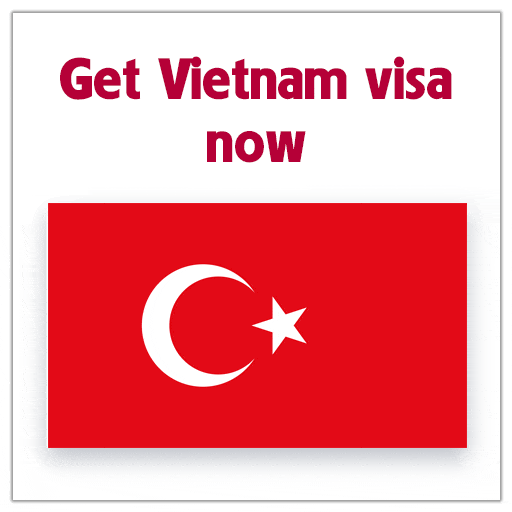
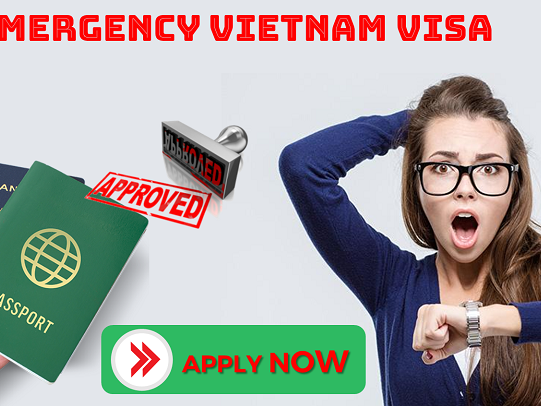
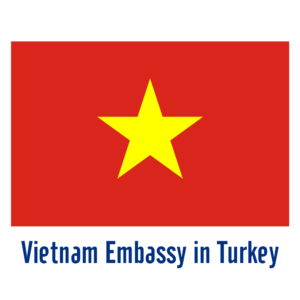

Leave a Reply